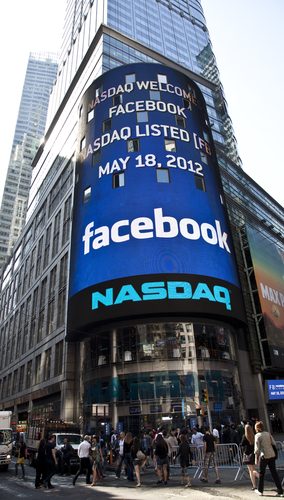Nasdaq Charged $10m Over Facebook IPO Failures

Nasdaq slapped with SEC charge twice what was expected a matter of months ago
Nasdaq has settled with the US Securities and Exchange Commission (SEC) for $10 million (£6.6m) over “poor systems and decision-making” during the Facebook initial public offering (IPO).
When Facebook finally went public on 18 May last year, in an IPO that valued it at $104 billion, technical issues pooped the party.
Nasdaq Facebook IPO fails
 Nasdaq systems were overwhelmed by the interest in Facebook shares, meaning orders from a number of investment banks, including UBS and Citigroup, were not initially confirmed.
Nasdaq systems were overwhelmed by the interest in Facebook shares, meaning orders from a number of investment banks, including UBS and Citigroup, were not initially confirmed.
A 30-minute delay in trades led to repeat bids, as investors thought their orders had not been accepted.
Overall, the problems were thought to have resulted in $500 million in losses for investors. UBS alone said it suffered losses of $365 million, whilst Citigroup claimed losses of around $20 million.
Nasdaq could still pay out more, if legal challenges from investors rule in their favour. The exchange already offered compensation for those who lost out.
It was initially thought Nasdaq would be fined $5 million, but it is now looking at a penalty twice that. The charge is the largest ever against an exchange.
“This action against Nasdaq tells the tale of how poorly designed systems and hasty decision-making not only disrupted one of the largest IPOs in history, but produced serious and pervasive violations of fundamental rules governing our markets,” said George S. Canellos, co-director of the SEC’s division of enforcement.
The SEC said “a design limitation” in the system to match IPO buy and sell orders was at the root of the disruption.
Nasdaq thought it had dealt with the issue by “removing a few lines of computer code”, as senior team members agreed on a “Code Blue” conference call to not delay the start of secondary market trading in Facebook, the SEC said.
More than 30,000 Facebook orders were stuck in Nasdaq’s system for more than two hours as a result of officials not understanding the problem properly, according to the regulator.
“Too often in today’s markets, systems disruptions are written off as mere technical ‘glitches’ when it’s the design of the systems and the response of exchange officials that cause us the most concern,” said Daniel Hawke, chief of the SEC enforcement division’s Market Abuse Unit.
The glitch also caused problems in the trading of Zynga shares, for which Nasdaq failed to execute 365 orders.
Facebook declined to comment. Nasdaq had not responded to requests for comment at the time of publication.
Are you an expert on social networks? Take our quiz!